The Blood Type B Negative Diet is a personalized eating plan tailored for individuals with B negative blood type. It focuses on specific foods that promote health, energy, and weight management while avoiding those that cause inflammation or weight gain. This diet emphasizes lean meats, dairy, and certain grains, while limiting corn, lentils, and buckwheat. By following this plan, individuals can optimize digestion, reduce health risks, and enhance overall well-being.
1.1 Understanding the Blood Type B Negative Diet
The Blood Type B Negative Diet is based on the idea that individuals with B negative blood type thrive on a mixed diet rich in lean meats, dairy, and select grains. It avoids foods like corn, lentils, and buckwheat, which can cause weight gain or inflammation. This diet emphasizes balancing nutrients to support digestion, energy, and overall health. By focusing on beneficial foods, individuals can reduce health risks and improve well-being, making it a tailored approach to nutrition for B negative blood types.
1.2 Importance of a Blood Type-Specific Diet
A blood type-specific diet is crucial for optimizing health and preventing chronic conditions. For B negative individuals, this approach helps avoid foods that trigger inflammation and weight gain, promoting better digestion and energy. By tailoring meals to their blood type, individuals can enhance nutrient absorption, reduce health risks, and improve overall well-being. This personalized nutrition plan supports long-term health goals and ensures a balanced lifestyle tailored to their unique biological needs.
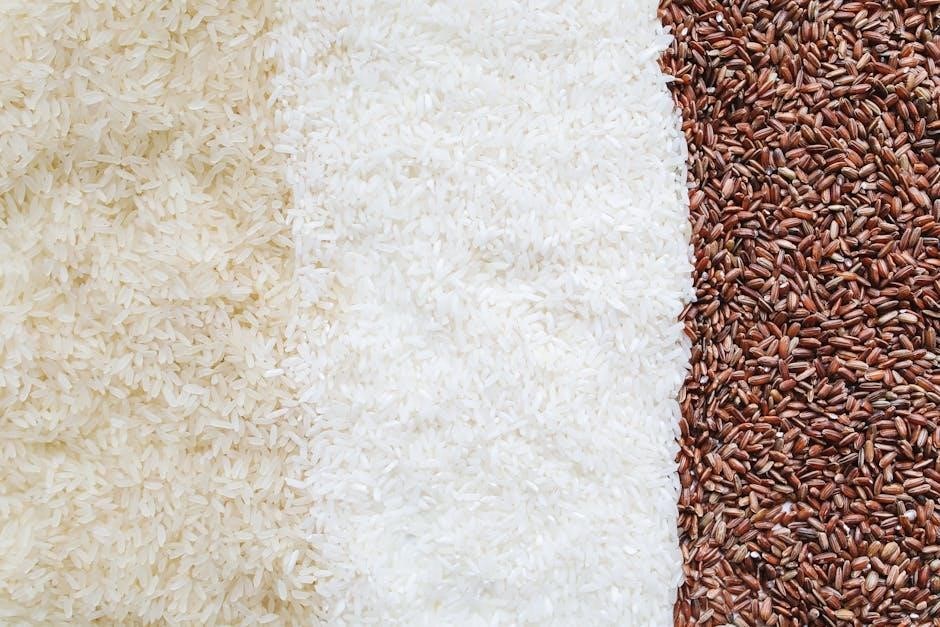
Science Behind the Blood Type Diet
The Blood Type Diet is based on how blood type influences digestion and health. Certain foods contain lectins that can cause adverse reactions in B negative individuals.
2.1 How Blood Type Affects Digestion and Health
Blood type B Negative individuals have unique digestive enzymes that influence how they process food. Their system benefits from a mixed diet, including meat, dairy, and grains, but reacts poorly to lectins in foods like corn, lentils, and buckwheat. These lectins can cause inflammation and digestive issues. By avoiding these problematic foods, B Negative individuals can improve nutrient absorption, reduce inflammation, and maintain better overall health and weight management.
2.2 The Role of Lectins in Foods
Lectins are natural proteins in foods that can interact with blood type antigens, potentially causing inflammation and digestive issues. For Blood Type B Negative individuals, certain lectins in foods like lentils, buckwheat, and corn can trigger adverse reactions. These lectins may disrupt digestion, impair nutrient absorption, and contribute to weight gain or inflammation. Avoiding these foods helps maintain optimal health and prevents potential complications associated with lectin sensitivity in Blood Type B Negative individuals.
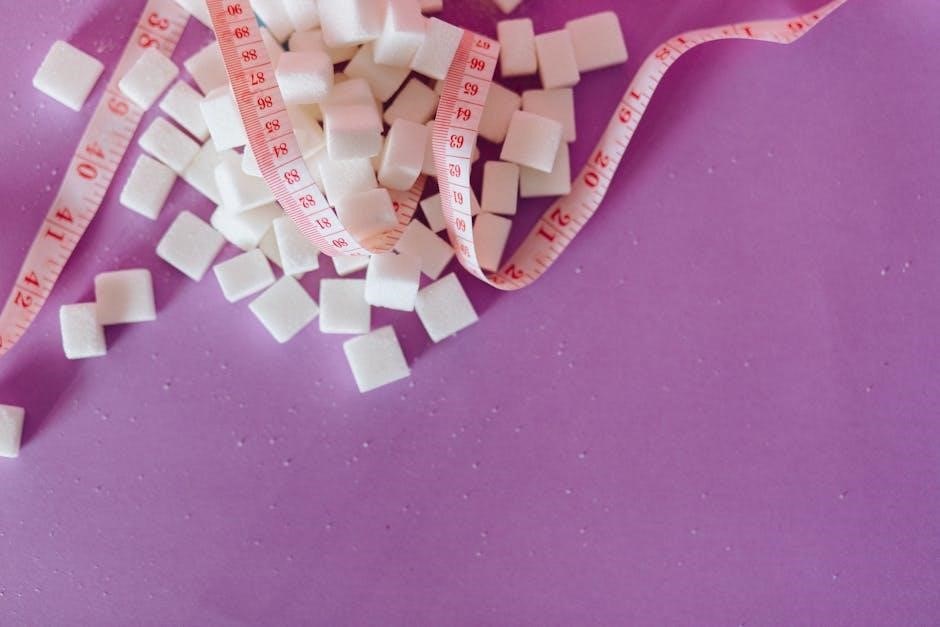
Foods Beneficial for Blood Type B Negative
Blood Type B Negative individuals thrive on a diverse diet including lean meats, fish, dairy, and select grains. These foods support digestion, energy, and overall health.
3.1 Meats and Poultry
For Blood Type B Negative individuals, lean meats like lamb, mutton, and venison are highly beneficial. These options are rich in protein and easy to digest, promoting energy and overall health. Poultry choices such as rabbit and game birds are also recommended. Opt for grass-fed or organic varieties to avoid harmful additives. Avoid processed meats like bacon and ham, as they can disrupt digestion. Moderate portions are key to maintaining balance in your diet.
3.2 Seafoods
Individuals with Blood Type B Negative benefit from incorporating deep ocean fish like salmon, sea trout, cod, halibut, and mackerel into their diet. These seafood options are rich in protein and omega-3 fatty acids, which support heart health and digestion. Moderate consumption is recommended to avoid overloading on marine-derived toxins. Fresh, wild-caught varieties are preferable over farmed options to ensure lower levels of harmful additives. Including these seafoods can enhance energy levels and overall well-being for Blood Type B Negative individuals.
3.3 Dairy Products
Dairy products are highly beneficial for Blood Type B Negative individuals, as they are easily digested and provide essential nutrients. Skim or 2% milk, yogurt, cottage cheese, and mozzarella are recommended for their protein and calcium content. These options support healthy digestion and energy levels without causing inflammation. Avoid high-fat cheeses like cheddar or Parmesan, as they may hinder weight management and overall well-being. Incorporating these dairy products can enhance the effectiveness of the Blood Type B Negative Diet and promote long-term health benefits.
3.4 Grains and Pasta

Grains and pasta can be a healthy addition to the Blood Type B Negative Diet when chosen wisely. Oats, quinoa, brown rice, basmati rice, and spelt bread are highly beneficial, providing sustained energy and supporting digestion. Pasta made from rice flour or quinoa is also suitable. Avoid inflammatory grains like wheat and corn, as they may cause weight gain and discomfort. Incorporating these grains in moderation can enhance the overall balance of the diet, promoting better digestion and well-being for Blood Type B Negative individuals.
3.5 Vegetables
Vegetables play a crucial role in the Blood Type B Negative Diet, offering essential nutrients and promoting overall health. Leafy greens like spinach, kale, and arugula are highly beneficial, as are broccoli, beets, and bok choy. These vegetables support digestion and energy levels. Avoid inflammatory options such as corn, tomatoes, and certain nightshades. Incorporating a variety of vegetables ensures a balanced diet and helps maintain optimal well-being for individuals with Blood Type B Negative, aligning with the diet’s goals of improving health and preventing weight gain.
3.6 Fruits
Fruits are a vital part of the Blood Type B Negative Diet, providing essential vitamins and antioxidants. Beneficial options include apples, bananas, grapes, and pineapple, which support digestion and energy levels. Avoid inflammatory fruits like strawberries, kiwis, and mangoes, as they may trigger weight gain or discomfort. Incorporating a variety of fruits enhances nutritional balance and supports overall health for individuals with Blood Type B Negative, promoting a natural and sustainable diet plan that aligns with their unique biological needs.
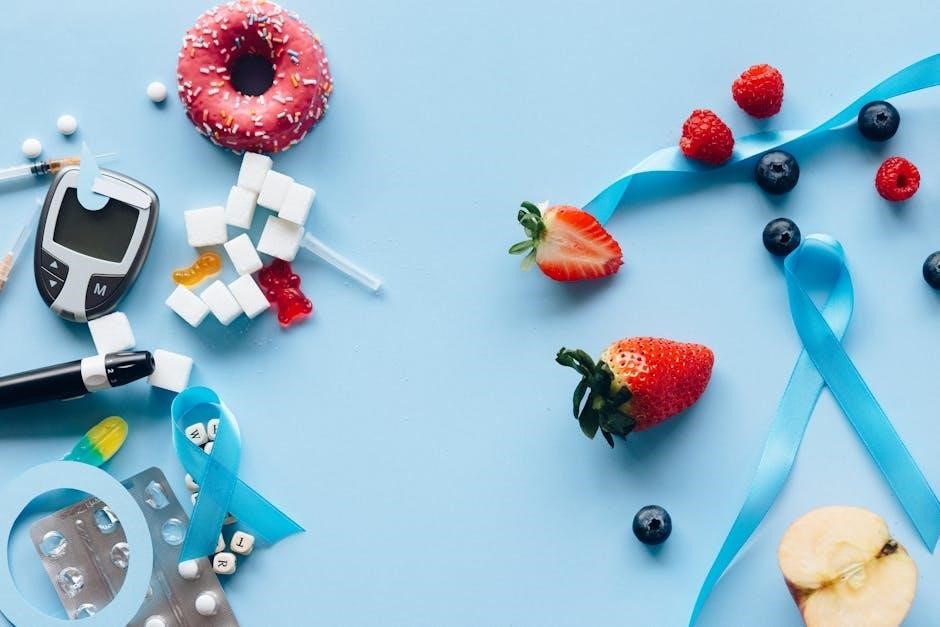
Foods to Avoid for Blood Type B Negative
Certain foods can trigger inflammation and weight gain for Blood Type B Negative individuals. Avoid corn, lentils, buckwheat, and wheat to maintain optimal health and digestion.
4.1 Inflammatory Foods
Certain foods can cause inflammation in individuals with Blood Type B Negative. Corn, lentils, buckwheat, and wheat should be avoided, as they can trigger weight gain and digestive issues. These foods contain lectins that may disrupt the balance of gut health and energy levels. Additionally, processed foods and high-sugar snacks can exacerbate inflammation; Minimizing these items helps maintain optimal health and prevents potential long-term complications. By eliminating inflammatory foods, individuals can enhance digestion, reduce bloating, and support overall well-being.
4.2 Foods That Cause Weight Gain

Certain foods can lead to weight gain in individuals with Blood Type B Negative. Processed foods, high-sugar snacks, and refined grains should be avoided, as they can slow metabolism and increase fat storage. Additionally, foods like chicken, pork, and some dairy products may contribute to weight gain if consumed excessively. These foods can hinder digestion and energy balance, making it harder to maintain a healthy weight. Opting for lean proteins, whole grains, and vegetables helps promote a balanced diet and supports weight management.
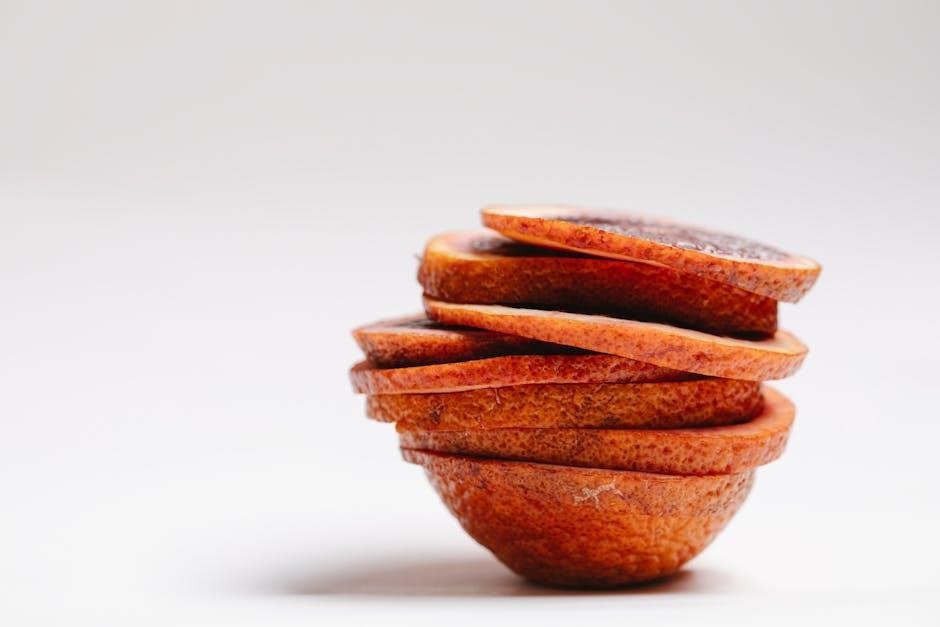
Herbal Teas and Supplements for Blood Type B Negative
Herbal teas like ginger, chamomile, and peppermint support digestion and immunity for Blood Type B Negative individuals. Supplements such as magnesium and probiotics enhance nutrient absorption and overall health.
5.1 Recommended Herbal Teas
Herbal teas like ginger, licorice root, and alfalfa are highly beneficial for Blood Type B Negative individuals. Ginger aids digestion and reduces inflammation, while licorice root supports adrenal function. Alfalfa promotes immune health and balances blood sugar levels. Additionally, teas such as dandelion and burdock root help detoxify the liver and improve overall well-being. These teas align with the diet’s principles, enhancing digestion and boosting immunity without causing adverse reactions. Incorporating them into your routine can further optimize the benefits of the Blood Type B Negative Diet.
5.2 Beneficial Supplements
Supplements like licorice root, ginseng, and Saint-John’s Wort are beneficial for Blood Type B Negative individuals. Licorice root supports adrenal function and digestion, while ginseng boosts energy and mental clarity. Saint-John’s Wort helps reduce stress and improve mood. Additionally, multivitamins tailored to blood type B can fill nutritional gaps, and probiotics support gut health. These supplements enhance the diet’s effectiveness, promoting overall well-being and immune function without causing adverse reactions. They are recommended to complement the dietary plan and improve long-term health outcomes.
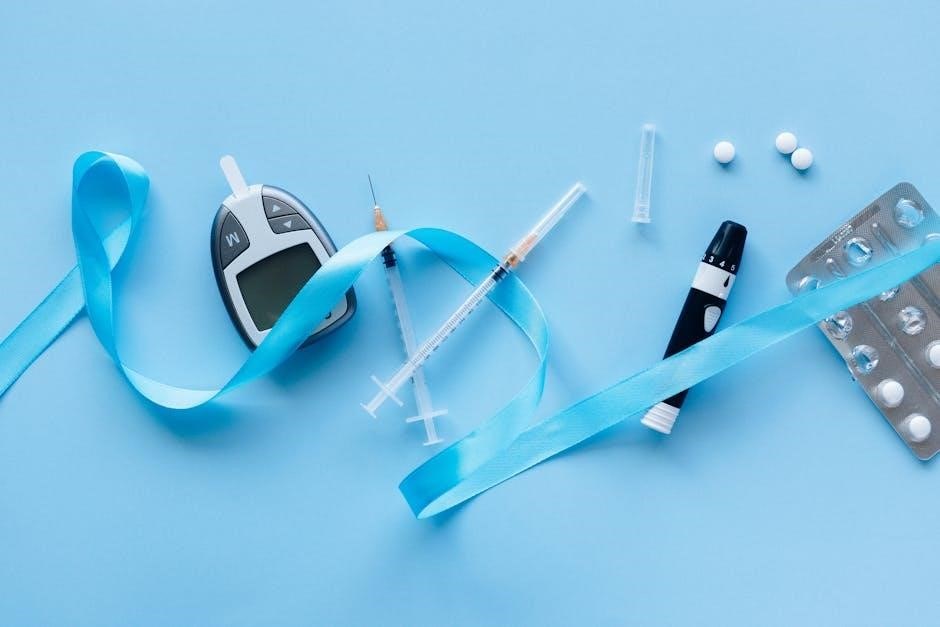
Sample Meal Plan for Blood Type B Negative Diet
A sample day includes lamb or cod for breakfast, broccoli and carrots for lunch, and venison or fish for dinner, with herbal teas like ginger or peppermint.
6.1 Breakfast Ideas
Start your day with eggs scrambled with spinach or mushrooms, paired with a slice of Ezekiel bread. Opt for lean meats like lamb or venison slices. Include dairy like yogurt or cottage cheese with berries. Oat or rice flour pancakes are great options. Smoothies with banana, almond milk, and spinach are nutritious. Herbal teas like ginger or peppermint complement the meal. Avoid inflammatory foods like corn or buckwheat. Incorporate beneficial grains and vegetables to kickstart your day energetically.
6.2 Lunch and Dinner Options
For lunch and dinner, focus on lean meats like lamb, mutton, or venison, paired with steamed vegetables such as broccoli, carrots, or green beans. Grilled or baked fish like salmon or cod is also an excellent choice. Incorporate grains like quinoa, brown rice, or oat flour pasta. Add a side of roasted or sautéed veggies like asparagus or Brussels sprouts. Avoid inflammatory foods like corn or lentils. Season meals with herbs and spices for added flavor. This balanced approach ensures optimal nutrition and digestion for Blood Type B Negative individuals.
6.3 Snacks and Beverages
Healthy snack options for Blood Type B Negative include raw or roasted vegetables like carrots, cucumbers, and bell peppers. Fresh or dried fruits such as apples, berries, or apricots are also beneficial. Nuts and seeds like almonds, pumpkin seeds, or sunflower seeds make great snacks. Herbal teas like ginger, peppermint, or chamomile are excellent beverage choices. Avoid sugary drinks and opt for water or alkaline-rich beverages. These snacks and drinks support energy levels and digestion while aligning with the dietary needs of Blood Type B Negative individuals.
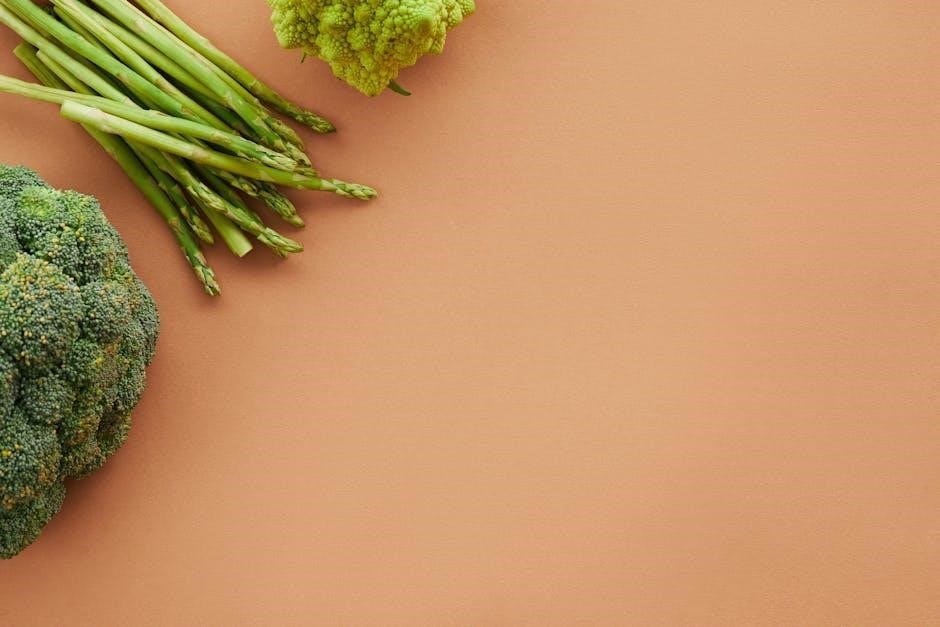
Creating a Blood Type B Negative Diet Food List PDF
Create a Blood Type B Negative Diet Food List PDF by categorizing beneficial and avoidable foods. Use templates from websites like TemplateLab or Listonic for organization.
7.1 Tips for Organizing Your Food List
Organizing your Blood Type B Negative Diet Food List PDF involves categorizing foods into sections like meats, seafood, dairy, grains, vegetables, and fruits. Use clear headings and bullet points for easy reading. Highlight beneficial foods in green and avoidable ones in red. Include notes on portion sizes and meal frequency. Use checklists to track groceries and meal plans. Ensure the layout is visually appealing and easy to navigate for daily reference. Regular updates keep the list relevant and effective for your dietary needs.
7.2 Where to Find Printable Templates
Printable Blood Type B Negative Diet Food List PDF templates are available on websites like TemplateLab and Listonic. These platforms offer customizable and downloadable charts, ensuring organization and convenience. Additionally, Dr. Peter D’Adamo’s official resources provide detailed food lists tailored to your blood type. You can also explore health apps and dietary guide websites for easy-to-print formats. These templates often include sections for beneficial and avoidable foods, making meal planning straightforward and efficient for your specific dietary needs.
The Blood Type B Negative Diet offers numerous health benefits, including improved digestion, increased energy, and weight management. By adhering to the recommended food list, individuals can enhance overall well-being and reduce health risks associated with their blood type, leading to a more balanced and vibrant life.
8.1 Health Improvements
The Blood Type B Negative Diet can lead to significant health improvements, such as enhanced digestion, reduced inflammation, and boosted immunity. By eliminating harmful lectins and incorporating beneficial foods, individuals often experience improved blood flow and reduced fatigue; The diet may also help in managing conditions like bloating, joint pain, and skin issues, promoting a healthier and more energetic lifestyle tailored to their specific blood type needs;
8.2 Weight Management and Overall Well-being
The Blood Type B Negative Diet supports effective weight management by focusing on foods that avoid triggering inflammation or weight gain. By eliminating corn, lentils, and buckwheat, individuals can shed pounds more easily. The diet also promotes overall well-being by improving metabolism, enhancing energy levels, and reducing bloating. Adhering to this tailored plan can lead to better mental clarity, improved physical performance, and a stronger immune system, helping individuals maintain a balanced and healthy lifestyle.



